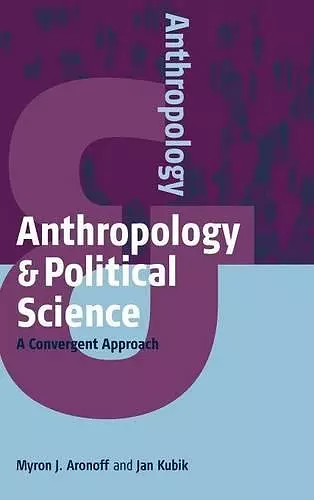Anthropology and Political Science
A Convergent Approach
Myron J Aronoff author Jan Kubik author
Format:Hardback
Publisher:Berghahn Books
Published:1st Nov '12
Currently unavailable, and unfortunately no date known when it will be back

What can anthropology and political science learn from each other? The authors argue that collaboration, particularly in the area of concepts and methodologies, is tremendously beneficial for both disciplines, though they also deal with some troubling aspects of the relationship. Focusing on the influence of anthropology on political science, the book examines the basic assumptions the practitioners of each discipline make about the nature of social and political reality, compares some of the key concepts each field employs, and provides an extensive review of the basic methods of research that “bridge” both disciplines: ethnography and case study. Through ethnography (participant observation), reliance on extended case studies, and the use of “anthropological” concepts and sensibilities, a greater understanding of some of the most challenging issues of the day can be gained. For example, political anthropology challenges the illusion of the “autonomy of the political” assumed by political science to characterize so-called modern societies. Several chapters include a cross-disciplinary analysis of key concepts and issues: political culture, political ritual, the politics of collective identity, democratization in divided societies, conflict resolution, civil society, and the politics of post-Communist transformations.
"Anthropology and Political Science does the important work of demonstrating fruitful openings in two fields of study. Political scientists have the most to gain by becoming aware of the historical specificity of their models, perhaps developing less American and ethnocentric perspectives that can index alternative futures. But anthropologists might also gain from political science approaches by being more precise and rigorous in their formulation of problems and use of concepts. Aronoff and Kubik do a real service by underscoring the importance of such dialogue." · Perspectives on Politics
“A person encountering the challenge of integrating anthropology and political science for the first time will find the book engaging and informative. It is a book that could profitably be used as an adjunct text in methods classes or theory classes in both anthropology and political science…[It] is a welcome addition to the conversation between these two disciplines.” · Political Science Quarterly
“Theoretically extremely rich…this book ranges over a wide expanse of topics and themes...the authors present an outstanding critical understanding of five different types of ethnography—traditional/positivistic, interpretivist, postmodern, global (multiple research sites) - and paraethnography…For all of its theoretical complexity, the payoff in navigating this outstanding book is well worth the effort.” · Israel Studies Review
“What a welcome book! Myron J. Aronoff and Jan Kubik, two erudite, widely read, and innovative scholars, have provided an insightful and much-needed map that charts the terrain linking politics and culture. This intervention into a long-standing conversation about the boundaries of the ‘political’ will stimulate students for years to come. “ · EdSchatz, University of Toronto
ISBN: 9780857457257
Dimensions: unknown
Weight: 662g
368 pages